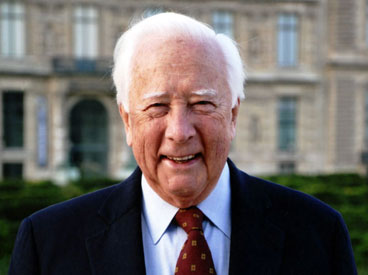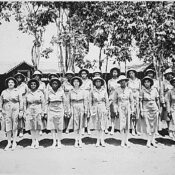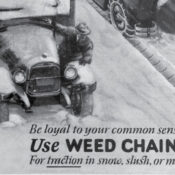Q: It’s interesting that you’ve seen this problem at Ivy League schools, as well as at state schools.
DM: We have the greatest universities in the world. But that doesn’t mean our universities can’t do a better job. History can include the history of art, music, literature, theater, dance, and science. It is not and should not be exclusively of interest only to those who have an interest in the military, or in the workings of government.
I want everyone to know what pleasure there is in reading history, and what benefit there is for all of us. We talk about the need for leadership. There is no better way to teach leadership than to teach history. The outstanding leaders we’ve had in our highest office, with very few exceptions, have all been students of history.
Q: Do you think blame lies with teachers?
DM: No, my criticism is not aimed at the teachers. Teachers are the most important people in our society. Sure, some are better than others, some are truly quite boring. But that doesn’t denigrate the whole profession. The teachers we remember as “great” have been the ones that have opened our eyes, and changed our lives. My eldest son is a high school English teacher. [Incidentally, his son got a lot of attention when he gave a commencement speech titled, “You’re Not Special.” See saturdayeveningpost.com/american-education.]
That said, I do think that teachers who are preparing for a career in teaching should not be granted degrees in education. Instead, they should have to have a degree in the subject they will be teaching. The essence of great teaching is being thoroughly familiar with and enthusiastic about the subject you are teaching. An old teacher’s adage is “Show ’em what you love.” But you can’t love something you don’t know, any more than you love someone you don’t know.
Q: Where do textbooks come in? I remember lugging one around in high school and not being too inspired.
DM: So many of them are so boring and poorly written, unimaginative. I don’t begin to dismiss the whole genre—there are some that are excellent. But by and large, the idea of making some little kid lug that big 10-pound thing home and being required to read it every night—how would you like that to happen to you? What is especially nonsensical about it is the fact that there’s no end of wonderful books to read. Give them good books! I wouldn’t assign any student to read something I didn’t think was a wonderful book. When I taught at Cornell, I did not assign any textbook reading.
But the main thing is to get them getting their hands dirty. Go where things happened. Feel what it was like in the snow at Valley Forge. Give them problems to solve. Subjects they have to become the world’s expert on. Take advantage that so many students have cameras—tell them to make their own documentaries. Give them an assignment on a member of the community who’s had an interesting life, or some building about to be torn down. Don’t be boring! Don’t act like history class is a required passage or exercise through which we each must go. Invite them to get on one of the best rides there is.
Q: Do you think the widespread testing in schools is to blame for any of this?
DM: There’s no doubt that history has been set on the backburner. Reading and math and science are the subjects that are being emphasized and tested. Some of us are saying, “Well, when you teach reading, you can use the literature of history, too.” You can use Lincoln’s Second Inaugural Address, or Martin Luther King Jr.’s “Letter From a Birmingham Jail.” These and other documents are wonderful teaching tools from our nation’s history.
I think we have to reappraise what we think a full, balanced, durable education is. In my view, it must include history. Indeed, in my view, if there were only one subject you can teach, it ought to be history. You can teach math, science, art, music, political strategy, military strategy, and all the rest through history. It’s all there.
Q: With the success of films like last year’s Lincoln and many of the docu-dramas on TV, it seems clear that, at least when it comes to entertainment, some people are keenly interested in American history.
DM: I hosted American Experience for 12 years on PBS. And they did a survey to find out who was watching. We were astonished at the results. We thought it would be older folks who were nostalgic about their memories of the Depression or World War II. But it was people in their late 30s and early 40s, who had missed these things in school, and wanted to catch up. I think that there is such an interest in books biographers, historians—written for popular interest, and movies like Lincoln. The HBO series that Tom Hanks made of my John Adams book with Laura Linney and Paul Giamatti had a huge audience for that very reason. People want to know this stuff. We’re not trying to make them eat or swallow something they’re not ready for.
Q: You were the host of a television show, but you’ve also said that our dependence on video and mobile devices is part of the problem.
DM: It’s true. With smartphones and computers, you don’t have to know or remember anything—you just look it up. The computer replaces your brain. And young people’s whole sense of spending their time in a worthwhile fashion has been so corrupted by television.
We talk about this or that being bad for your health. Well, the brain is a muscle. And it needs to be exercised. There are studies that have shown that your brain is more active when you’re staring at a blank wall than when you’re watching television. I give the advice: However little television you watch, watch less. It’s bad for you.
Q: So, is there any hope for the younger generations?
DM: As I said, I have 19 grandchildren. I am very fond of young people, and there’s nothing wrong with young people today. I know how bright they are. They know things I have no idea about. I’m not just the old grouch complaining about this spoiled young crowd coming along.
But I am concerned that we’re becoming a nation of spectators. We’ve been so saturated with the notion that pleasure comes from ease, comfort, longer vacations, more comfortable couches, bigger TVs, all of that. But in fact, luxury has nothing to do with happiness.
History teaches us that you have to get out and do things: Great accomplishments don’t happen by people sitting around and looking at news broadcasts about it. You have to work, and that can be the greatest joy in life.
Become a Saturday Evening Post member and enjoy unlimited access. Subscribe now



